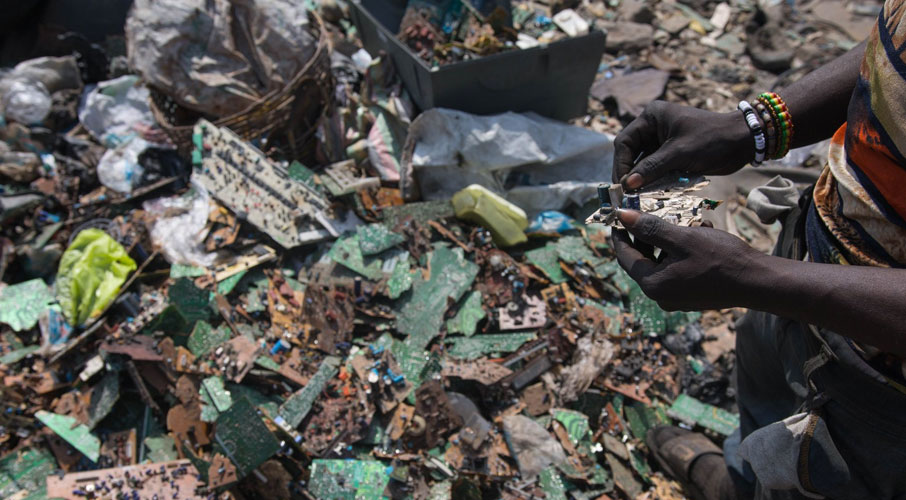Cover photo: Aline Tong via shutterstock.com
Technology has advanced at exponential rates since the Industrial Revolution. Our modern-day lifestyles would not be possible without the electronics that we are able to utilize on a daily basis.
Electronic Waste (E-Waste) is composed of the following items, according to the Environmental Protection Agency (EPA):
TVs, computer monitors, printers, scanners, keyboards, mice, cables, circuit boards, lamps, clocks, flashlight, calculators, phones, answering machines, digital/video cameras, radios, VCRs, DVD players, MP3 and CD players, kitchen equipment (toasters, coffee makers, microwave ovens), laboratory equipment (hot plates, microscopes, calorimeters), broken computer monitors and television tubes or CRT’s.
To be clear, these are the most commonly seen types of e-waste, but it is not a complete list. These items are described as E-Waste when they are nearing the end of their life or have already reached it, and are awaiting disposal.
While these items provide us with luxuries in our modern day of life, they are associated with a multitude of environmental and social justice concerns worldwide.
The ways in which electronic devices and items are made has received criticism from environmentalists, activists, and scientists who question the sustainability and equity of industries that manufacture such products.
Electronics and tech products utilize a variety of heavy metals to compose their circuit boards, chips, bodies, and other elements of a finished product. E-waste contains chemicals, compounds, and metals that are known to be harmful to human health and the environment. This includes mercury, lead, lithium, cobalt, beryllium, brominated flame retardants, and cadmium, among others.
A Breakdown of the Global Electronic Waste Issue
The issues arise here both in manufacturing and disposal processes. Many compounds used in the manufacturing process of electronics require manual labour to extract them from the earth. Economically, they contribute to government revenue and boost employment, yet there are impacts many do not see. Developing nations who source mined materials perpetuate, “violence, child labour, escalation of gender inequalities, health and environmental effects including deforestation and pollution.”

Image:Aline Tong via shutterstock.com
Environmentally, both as beginning and end stages of an electrical products’ life, harmful consequences look like habitat loss from mining and excavations, pollutants in the air, water, and soils, and a whopping 6.92 million tons of E-Waste generated each year. Thus, creating a waste management dilemma that governments are still trying to solve, where only 15% of this waste is currently recycled. The value of the raw materials contained in the e-waste produced in the U.S. during 2019 was $7.49 billion.
As consumers, we are also targeted by these systems that use marketing techniques and social pressures that effectively make us purchase electronic devices we may not truly need. It is the duty and responsibility of governments to coordinate and update systems in place to more environmentally friendly ones. However, there are still actions that we can take as consumers to assist.
Awareness is key. The more aware society is about an issue, the more support there will be for social change. Purchasing used technology to replace your previously owned ones is a great measure that will typically save you money, reduce waste, and conserve resources over time. We can do our best to research E-Waste recyclers in our areas with strict standards and recycle their E-Waste in the United States. Donating or selling our devices when we upgrade to newer versions, rather than disposing of them, is another option.
The topic of E-Waste is a national and global endeavour that will require governments, society, organizations, and corporations around the globe to work together to deliver more equitable and less wasteful manufacturing systems for electronics and technology.
Like what we have to say? Sign up to subscribe to email alerts and you’ll never miss a post.










